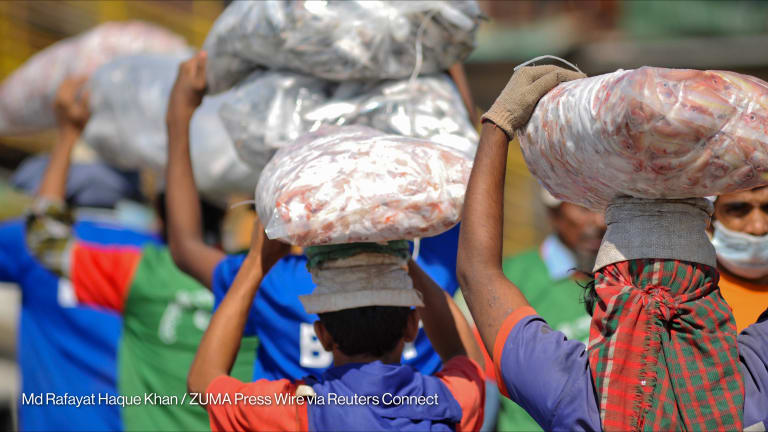
Africa relies on traditional biomass and waste fuels for almost half of its primary energy supply. An estimated 600 million people still lack access to electricity, and household air pollution resulting from the combustion of wood, dung, and charcoal leads to the death of an estimated 600,000 Africans each year.
The continent therefore urgently needs a massive rollout of modern energy services to improve the quality of life and the productivity of its underserved and rapidly growing population. Such a development would also power industrialization and urbanization.
At the same time, the world needs Africa to leapfrog to a low-carbon energy regime to help avoid catastrophic global climate change. But who will fund it? This structural transformation in Africa’s energy sector will require innovative financing mechanisms to unlock the continent’s vast renewable energy, or RE, potential and meet burgeoning demand, thereby boosting inclusive and sustainable development.
In Africa, investments in the green energy sector offer potentially attractive returns, although RE investors face a number of challenges. The prevalence of political, economic, technical, and environmental risks on the continent means that investors demand higher returns, raising the cost of capital. Some of the main obstacles are uncertain or inadequate policy and regulatory frameworks, underdeveloped capital markets, insufficient effective demand, and a lack of managerial and technical capacity.
Despite these challenges, a number of significant RE projects have recently been completed or are currently underway in several African countries. Broadly, these projects fall into two categories: Large-scale, grid-connected RE projects, which are typically financed by large institutional investors and governments; and small-scale, off-grid solar power systems provided by decentralized energy service companies, or DESCOs, to customers in low-income rural communities.
See more related topics.
► Q&A: Finance hurdles for mini grid projects in Africa
► Opinion: Solar tariffs to affect world's poorest
► Linking renewables to economic growth: The case for climate-centered SDGs
Both approaches have an important role to play in Africa’s evolving energy story.
In Cabo Verde, four wind farms constructed by a public-private partnership that was partly financed by international development banks provide a quarter of the island nation’s electricity. In Ethiopia, the government is driving an ambitious hydropower build program, funded by international borrowing as well as an innovative scheme attracting “diaspora” funds.
Kenya is the continent’s leading geothermal power developer, with recent capacity additions at its Olkaria plant financed through the state-owned utility Kengen, supported by the Kenyan treasury, the World Bank and the European Investment Bank. Kenya has also made its mark with Africa’s largest wind farm, a 310-megawatt facility that was funded by private investors.
The Kingdom of Morocco has been a pioneer of concentrated solar power, with its 580 megawatt Noor plant partially funded through a green bond issued by the Moroccan Agency for Solar Energy. South Africa’s robust and transparent RE Independent Power Producer Procurement program has attracted more than $15 billion in finance from international and domestic investors, with nearly 6,400 megawatts of renewable electricity capacity procured in over 100 projects.
These examples of large-scale RE projects show that various financing sources, including donors, development finance institutions, governments, and private investors, and mechanisms such as grants, loans, loan guarantees, corporate finance, and equity injections have been successfully deployed in Africa. Although public investors have played a critical role in many of Africa’s successful RE projects to date, constraints on government budgets have meant that private-public partnerships and independent power producers are becoming increasingly popular.
Both top-down and bottom-up financing solutions have a role to play in Africa’s nascent energy transition.
—The small-scale, off-grid RE sector utilizes a fundamentally different financing model. While relying on donor or development finance institution support in the startup phase, DESCOs are implementing novel end-user financing schemes in which customers purchase solar photovoltaic energy on a pay-as-you go basis, using mobile payment platforms.
Pay-as-you-go systems help to reduce the up-front costs and allow greater payment flexibility, and therefore reduce barriers and risks of off-grid energy systems for low-income customers and energy providers alike. In the past few years, DESCOs such as Off-Grid Electric and Mobisol have installed hundreds of thousands of solar home systems in East and West Africa. This innovative approach to lighting up rural Africa provides an illuminating example of synergistic technological leapfrogging — not only are the latest generations of telecommunication (mobile), energy (renewable solar PV) and finance (mobile payments) being utilized, but they are being fused in a way that makes a whole new genre of energy service possible.
These practical examples demonstrate that both on-grid and off-grid RE investments can be successful in low-income and middle-income African countries. Clearly, different financing mechanisms are appropriate for different types and scales of RE. In particular, both top-down and bottom-up financing solutions have a role to play in Africa’s nascent energy transition. The various economic and institutional obstacles can be surmounted through the implementation of appropriate policy frameworks, regulations and incentive structures. These can help to attract the necessary finance that can unlock the huge potential of Africa’s energy resources and contribute to the continent’s sustainable development.








